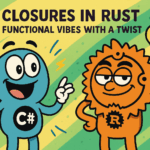
Closures in Rust: Functional Vibes with a Twist
- Chris Woodruff
- May 13, 2025
- Rust
- .NET, C#, dotnet, programming, rust
- 0 Comments
Welcome to Day 33, and today we are jumping into closures. If you have been writing C# for a while, you are no stranger to lambdas, delegates, and maybe even expression trees. Rust has closures, too, and they bring a nice functional flavor to the language with some unique Rust twists.
Lambdas and Delegates in C#: The Familiar Territory
In C#, you have probably written something like this a thousand times:
Func<int, int> square = x => x * x; Console.WriteLine(square(5)); // 25
Or passed a lambda into LINQ:
var evens = numbers.Where(n => n % 2 == 0);
C# lets you define small anonymous functions with lambdas and use them wherever a delegate or expression tree is expected.
The Rust Way: Closures with Capture
In Rust, closures look very similar at first glance:
let square = |x: i32| x * x;
println!("{}", square(5)); // 25
You use the | | syntax to define parameters; the body comes after the arrow or directly if it is an expression.
But here is the twist. Rust closures can automatically capture variables from their environment. This makes them feel more like C# lambdas with closures rather than just plain delegates.
Example:
let factor = 2;
let multiply = |x: i32| x * factor;
println!("{}", multiply(5)); // 10
The closure grabs factor from the surrounding scope without needing you to pass it explicitly.
Closures and Traits: Fn, FnMut, FnOnce
Traits power Rust’s closures. Three main traits describe what kind of access the closure needs to its environment:
Fn: Takes arguments by reference, does not mutate captured variablesFnMut: Can mutate captured variablesFnOnce: Consumes captured variables and can only be called once
You do not have to specify these most of the time. The compiler figures it out based on what your closure does. But you can add these traits explicitly when needed, especially in generic functions.
Example of a closure that mutates captured state:
let mut count = 0;
let mut increment = || {
count += 1;
println!("Count: {}", count);
};
increment();
increment();
This closure implements FnMut because it modifies count.
Comparing to Expression Trees
In C#, expression trees are often used when you need to compile or analyze the structure of a lambda rather than execute it:
Expression<Func<int, int>> expr = x => x * x;
Rust does not have a direct equivalent of expression trees in the same way. Instead, Rust favors higher-order functions and generics to handle most functional use cases. If you want to build something like an expression tree, you would define your own enums and interpret them manually.
Returning Closures from Functions
In Rust, closures have anonymous types, so if you want to return a closure from a function, you usually have to use impl Fn or Box<dyn Fn>.
Example:
fn make_multiplier(factor: i32) -> impl Fn(i32) -> i32 {
move |x| x * factor
}
let multiply_by_3 = make_multiplier(3);
println!("{}", multiply_by_3(10)); // 30
Notice the use of move. This tells Rust to move ownership of captured variables into the closure.
Why Closures Feel Familiar Yet Different
- You get the same flexibility as C# lambdas
- Rust’s capture behavior feels closer to C# closures
- You explicitly choose when a closure consumes its environment
- Type inference handles most of the heavy lifting for closure types
Closures in Rust combine the convenience of functional programming with Rust’s usual safety guarantees. They let you write flexible, composable code without giving up control over memory and lifetimes.
Wrapping It Up
Closures are one of those tools that feel right at home if you have written C# lambdas, but they bring a little extra flavor when you add Rust’s traits and ownership model into the mix.
Tomorrow, we will look at iterators and functional combinators, such as map and filter. See you then!






